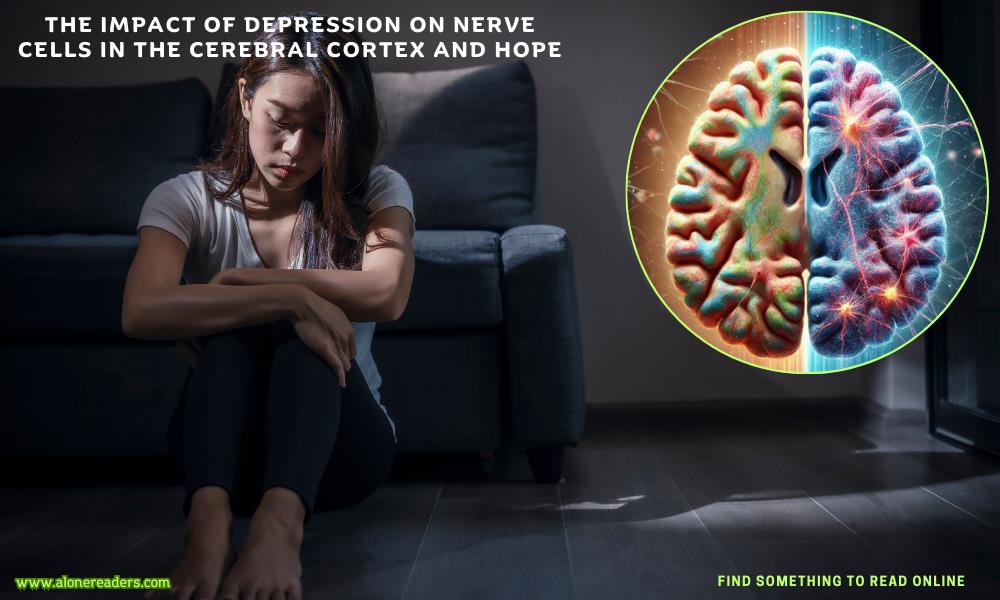
Depression is a profound mental health disorder that affects millions of people worldwide. It is more than just feeling sad or going through a rough patch; it is a serious condition that can significantly impact one’s quality of life. One of the lesser-known but deeply concerning effects of depression is its ability to destroy the nerve cells in the frontal part of the cerebral cortex, which is crucial for maintaining hope and envisioning a positive future.
The cerebral cortex is the outermost layer of the brain, playing a key role in memory, attention, perception, cognition, awareness, thought, language, and consciousness. The frontal part of the cerebral cortex, in particular, is associated with higher cognitive functions, including planning, decision-making, and moderating social behavior. This region is also linked with our ability to experience hope and positivity about the future.
Depression disrupts the normal functioning of the brain in numerous ways. Research has shown that prolonged depression can lead to structural changes in the brain, particularly in the prefrontal cortex. This part of the brain is essential for regulating emotions, making decisions, and controlling impulses. When someone is depressed, the levels of neurotransmitters like serotonin and dopamine, which are crucial for mood regulation, are often imbalanced. This imbalance can lead to a reduction in the size and function of the prefrontal cortex.
The destruction of nerve cells in the prefrontal cortex due to depression is a significant issue. These nerve cells, or neurons, are responsible for transmitting information throughout the brain. When these cells are damaged or destroyed, it hampers the brain's ability to communicate effectively. This can lead to difficulties in thinking clearly, making decisions, and regulating emotions. Moreover, the loss of these cells can erode one's ability to feel hopeful about the future.
Hope is a critical component of mental health and well-being. It allows individuals to envision a better future and motivates them to work towards it. When depression destroys the nerve cells in the prefrontal cortex, it undermines this ability. People struggling with depression often find it challenging to see beyond their current pain and despair. This can create a vicious cycle where the lack of hope exacerbates depressive symptoms, making it even harder to recover.
The impact of depression on the brain’s structure and function is not only devastating but also long-lasting. Studies using brain imaging techniques have shown that individuals with a history of depression often have reduced gray matter volume in the prefrontal cortex. This reduction is associated with impaired cognitive functions and a diminished capacity for positive emotions and hope. The brain's plasticity, or its ability to adapt and change, can be compromised by chronic depression, making recovery more difficult.
Understanding the connection between depression and the destruction of nerve cells in the cerebral cortex underscores the importance of early intervention and treatment. Psychotherapy, medication, and lifestyle changes can help manage depression and potentially prevent or mitigate the damage to the brain. Cognitive-behavioral therapy (CBT), for example, is effective in helping individuals challenge negative thought patterns and develop healthier ways of thinking, which can restore hope and improve overall brain function.
Medication, such as antidepressants, can help balance the levels of neurotransmitters in the brain, supporting the restoration of normal brain function. Additionally, lifestyle changes, including regular exercise, a healthy diet, sufficient sleep, and stress management techniques, can support brain health and improve mood.
Moreover, emerging research in neuroplasticity offers hope for those affected by depression. The brain has an inherent ability to heal and rewire itself, given the right conditions. Therapeutic interventions, mindfulness practices, and activities that stimulate the brain can promote the growth of new nerve cells and connections, potentially reversing some of the damage caused by depression.
It is crucial to raise awareness about the profound effects of depression on the brain and the importance of seeking help. Mental health should be a priority, and individuals should feel empowered to reach out for support without stigma. By understanding the biological impact of depression, we can foster more empathy and provide better care for those affected by this debilitating condition.
In conclusion, depression is not just a temporary state of sadness; it has the power to destroy nerve cells in the frontal part of the cerebral cortex, severely impacting one’s ability to have hope for the future. This destruction impairs cognitive functions, emotional regulation, and the capacity to envision a positive future. Early intervention, effective treatment, and a supportive environment are essential in managing depression and mitigating its impact on the brain. By prioritizing mental health and promoting understanding, we can help those suffering from depression to find hope and healing.